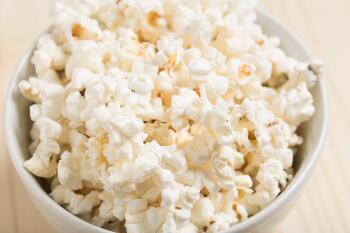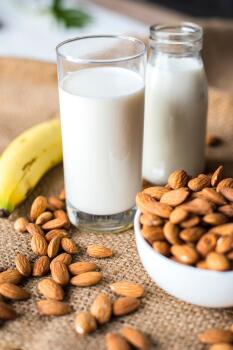
Eating on the Run: Healthy Gluten-Free Snacks
 There are mixed opinions about the role of snacks – some believe that if you eat a well-balanced diet that is comprised of three meals a day, you may not need snacks. Others say that snacks are a necessary component to maintain blood sugar and regulate hunger. I personally will listen to my body and sometimes have a snack and other days I won’t and just let my belly go empty until my next meal. I follow the principle that sometimes the digestive system needs a break. Whichever camp you fall in, there’s a couple of things to keep in mind: snacks are just that – snacks. They are not mini-meals. Snacks should be between 100-200 calories and not take up more than 20% of your total daily caloric intake. What this means to the consumer is take time to know the calories of your snacks choices. Whether it be a health food bar, piece of fruit, or a serving of crackers with a tablespoon of hummus, look at portion size and calories. Ideally, you want a satiating combination of protein, fiber, and healthy fats. Because nuts and seeds are calorie-dense, measure out the appropriate portion size. This will typically entail a small handful of nuts or 1-2 tablespoons of seeds.
There are mixed opinions about the role of snacks – some believe that if you eat a well-balanced diet that is comprised of three meals a day, you may not need snacks. Others say that snacks are a necessary component to maintain blood sugar and regulate hunger. I personally will listen to my body and sometimes have a snack and other days I won’t and just let my belly go empty until my next meal. I follow the principle that sometimes the digestive system needs a break. Whichever camp you fall in, there’s a couple of things to keep in mind: snacks are just that – snacks. They are not mini-meals. Snacks should be between 100-200 calories and not take up more than 20% of your total daily caloric intake. What this means to the consumer is take time to know the calories of your snacks choices. Whether it be a health food bar, piece of fruit, or a serving of crackers with a tablespoon of hummus, look at portion size and calories. Ideally, you want a satiating combination of protein, fiber, and healthy fats. Because nuts and seeds are calorie-dense, measure out the appropriate portion size. This will typically entail a small handful of nuts or 1-2 tablespoons of seeds.
When an individual is gluten-free, it’s too easy to grab processed “B & B’s (i.e., boxes and bags) of gluten-free snacks. I always encourage clients to eat naturally gluten-free. That is, avoid B & B’s and gravitate to whole, real foods for better nutrition. Most gluten-free snacks are non-nutritious and will be high in refined carbs and sugars. Below I have listed some of my favorite snacks that are whole, real foods, gluten free and should fit into any dietary approach:
- Popcorn with peanuts
- Turkey-wrapped cheese sticks
- Certified GF oatmeal, apple, walnuts, and cinnamon
- Roasted chickpeas
- Cucumber and hummus sandwiches
- Grass-fed beef jerky (with no MSG and skip anything that is marinated to keep the sugars low)
- Fruit and nuts
- Gluten-free toast or crackers with beans and olive oil (check out the Crunchmeister brand of crackers)
- Plain Greek yogurt parfait with GF granola and berries
- Bite-sized zucchini pizzas
- Dates
- Tomato-basil mozzarella skewers
- Bean salad with avocado
- DIY Trail mix
- Pureed soups or broth
- Tuna-lettuce cups
- Gluten-free rice cakes with nut butter and sliced banana
- Sweet potato chips with tzatziki sauce
- Half-a-melon with berries in the center
- Egg salad stuffed mini-peppers
- Fruit
Today’s Milk Alternatives
 It’s easy to see the demand for non-dairy milk alternatives when you walk by the milk case. With people being more health-conscious and taking a plant-based approach these days, many companies have jumped on board and are now offering non-dairy alternatives. About 83% of people are adding plant-based foods to their diets for health reasons. In the last five years, sales of non-dairy beverages have grown by 61% and if this trend continues, the non-dairy market will be valued at $3.3 billion.
It’s easy to see the demand for non-dairy milk alternatives when you walk by the milk case. With people being more health-conscious and taking a plant-based approach these days, many companies have jumped on board and are now offering non-dairy alternatives. About 83% of people are adding plant-based foods to their diets for health reasons. In the last five years, sales of non-dairy beverages have grown by 61% and if this trend continues, the non-dairy market will be valued at $3.3 billion.
Here are the leading plant-based, non-dairy contenders:
- Almond milk – considered the “gateway non-dairy milk.” It has fewer than half the calories that one one-percent, low-fat milk does. However, it’s short on protein. If you have a nut-allergy, check out some of the other options below.
- Soy milk – is losing steam because consumers have health concerns about the use of GMO seeds of this crop. It delivers about eight grams of protein with every eight-ounce serving.
- Coconut milk – with annual sales of $244 million, coconut milk holds third place in the market. It contains more saturated fat than other non-diary options, but it has a pleasant mouth-feel and taste.
- Other nut milks: pecan or cashew – typically low in carbs and high in dietary fibers, these milks are another option.
- Top Brands to Look for at the Store: Quaker, So Delicious, Forager, Mooala, Califia, Malk, Elmhurst, Rice Dream, and Blue Diamond. Expect to pay anywhere from $4.00-$6.00 for a half-gallon.
Katina’s Take Home Message: I personally drink plant-based, non-dairy milk alternatives for health and gut reasons. I mainly use it in my coffee, smoothies and as a substitute for milk in many recipes. Additionally, I also eat non-dairy yogurt. When possible, buy unsweetened versions to avoid extra sugars.
Katina Sayers is the owner/operator of Katina’s Nutritional Coaching Corner. She has an extensive background in health and education that began with degrees in exercise physiology, health and physical education, community health, and culminating with a doctoral degree in curriculum and instruction. She completed an advanced certificate of study in Integrative Nutrition and Health Coaching from the renowned Institute for Integrative Nutrition (IIN) in New York City. For the last four years, she has worked one-on-one with clients, presented a multitude of nutrition topics for large and small audiences, contracted with businesses to implement worksite wellness initiatives, and currently manages day-to-day food service operations at a local non-profit agency, as well as directs activities related to nutrition and health. Katina can be reached at ksayerswalker@gmail.com.
Latest News
Upcoming Events
Tully Free Library Turkey Trot 5K Run/Walk
All Day | 5872 Meeting House Rd, Tully, NY 13159
The Tully Free Library Turkey Trot 5K Run/Walk is held every year on Thanksgiving Day mornin…
Learn More ›Live Like Liam
All Day | Jamesville-DeWitt High School, 6845 Edinger Dr, De Witt, NY 13214
"Live Like Liam"... Celebrate life and community as you help fund important initiatives in L…
Learn More ›
Connect With Us
see the latest from Fleet Feet Syracuse